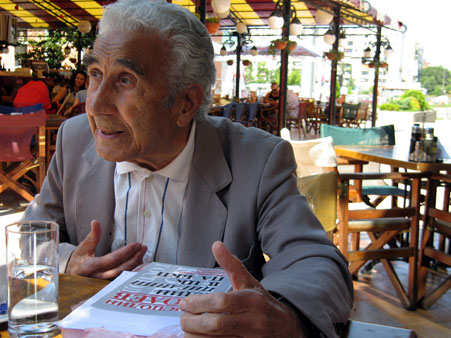
Thanks to L and B’s contacts with the Romano Centro in Vienna and B’s persistence on the telephone we have an appointment with K, one of the few Roma parliamentary representatives during the communist era. He has the presence of mind and way of expressing things—avoiding certain issues and emphasising others—that I associate with experienced politicians and diplomats. He decides, charmingly, to give us a short version of Roma history, pausing so that B can translate for us. He uses the word Gypsy and remarks on the fact that in other countries it is no longer used, says that it is not so important, and that whatever they are called or call themselves, they are inadvertent cosmopolitans. |
|
He uses the word Gypsy and remarks on the fact that in other countries it is no longer used, says that it is not so important, and that whatever they are called or call themselves, they are inadvertent cosmopolitans.
Throughout our history we have crossed borders, he says, and tried hard to ignore them: up till now 2 gold coins have always been a valid passport that raised the barriers. Historically we often carried letters of recommendation from one ruler to the next, from one local authority to the other, attesting to our good character. I remember then that in Kazanlak A and P told us that they had a letter from the mayor of their village which usually allowed them to travel without being harassed by the authorities in other areas. K says that the practice is dying out ‘since democracy came’. The Romany language newspaper has ceased to appear and the pressure to assimilate is continuing. Rulers have always told gypsies they could remain within their territory ‘if they became one of us’, which explains why there are Moslems, Christians and many other religions to be found amongst the Roma, Sinti and various subgroups who, he says, were always atheists in reality. The non-nomadic among us always wanted to stay in separate settlements, so we ‘could lean on each other’s shoulders’, thus the desire for separation is mutual, though the ‘walls of shame’ in some of the towns are not. The problems we face are, in the first place, social and only in the second place ethnic in nature. These cannot be solved by placing Roma families in ‘Bulgarian’ highrise apartments. Many do not want to live like that, and up to 80% of those who do return to the Roma district at the weekend to be with their family. The public-image gypsies come from operas like Carmen, books like Don Quixote, or even stories by Pushkin. And the happy, romantic, singing gypsy? That’s rubbish; all gypsy songs have a large portion of melancholy in them. Because of the continuing bad press regarding Roma, the political instrumentalisation of the issues involved, his own daughter and grand-daughter do not want to have anything to do with Roma culture at all, never even mentioning it.
|